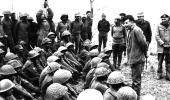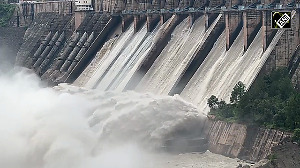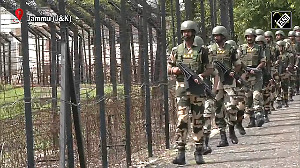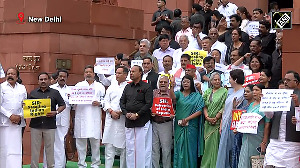'One can be sure that General Rawat will have all-round support and that the Indian Army will have a strong chief,' says Rear Admiral Sudarshan Shrikhande (retd).
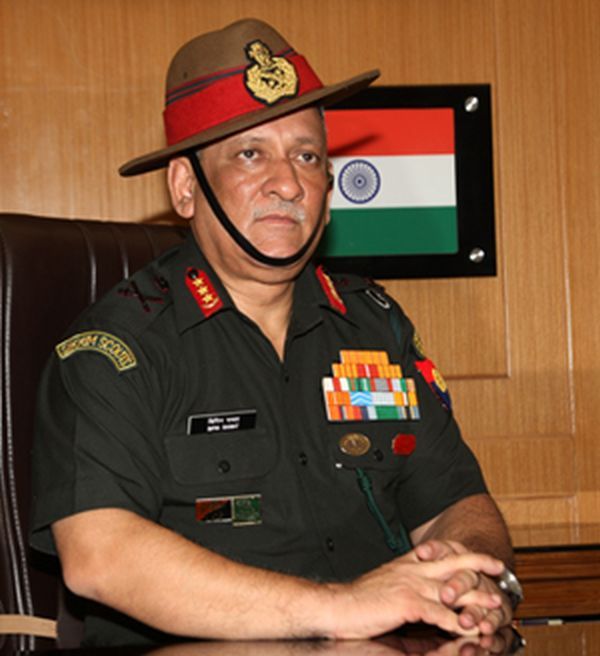
Much has already been written and voiced over the selection of the new army chief. Nonetheless, here is a slightly different viewpoint on some of the arguments for/against the appointment of the third or fourth-most senior army commander as the Chief of the Army Staff.
That Bipin Rawat happens to be his name or that the service in question is the Indian Army is generally irrelevant to the issue. Neither this government, nor any in the past can actually be faulted on 'violating' the principle of seniority.
It, in any case, is not a principle, or even a tenet, merely an oft-followed custom, quite unique to India. Neither should a custom be called a 'tradition.' The Services, especially, should not conflate the two.
Supporters of the government's decision (relying on references from electronic media debates and alleged explanations attributed to MOD officials) could also be faulted for highlighting secondary arguments, or in quoting precedents.
Importantly, no apologies are required. At the same time, some spokespersons for the Congress, sound quite rich when they insist that seniority should be the prime criterion for appointment when internally for them genealogy has trumped both seniority as well as merit in the party leadership for decades.
Let us consider some other reasons one by one, not necessarily in order of importance.
That there have been precedents/or never was there a precedent for supersession by more than 'one' name, is a specious argument.
Even if this were the first time that supersession has occurred, it would still be in order because 'seniority above all' is not a criterion that makes for logic.
It has not been followed in any armed forces, including in democratic or Communist States. In 1970, Admiral Elmo Zumwalt was appointed the US navy chief, stepping over 26 vice admirals and six admirals!
Even Britain has not given any consideration to this 'principle' at any time. So much for either custom or tradition!
In all promotions preceding the final one to four-star rank, seniority is not the governing criterion for selection in any case.
Therefore, defending this decision on the grounds that Congress governments have also done this in some cases need not be trotted out.
What could be said that in some earlier cases that this was done, a better, strong-willed general (or equivalent) was denied the opportunity to lead his Service.
The next argument: Since all the candidates are equally eligible, the senior-most becoming the chief is the appropriate thing to do.
This argument was crisply countered by Colonel R S N Singh on a television channel by saying that this was sometimes simply not true and that occasionally officers were manoeuvred into the inner track at the expense of others years before they come into the zone of final selection and were therefore already in the 'line of succession.'
This line, created adroitly, is then easier to preserve and protect. Bharat Karnad has also written similarly elsewhere. Nitin Gokhale has commented about the timidity often exhibited by those waiting in line for their turn.
While this is not so in the current case, and all those considered are greatly respected in the army itself, there is widespread belief that such lines can be created and nurtured with care to larger detriment.
The related apprehension, that the uncertainty of selection for chief may result in senior officers courting political masters is extremely unlikely.
On the contrary, to take Mr Gokhale's argument further, hopefully, it might spur more to be bold and forthright without worrying whether they are jeopardising their own chance at the top slot.
Why should a government mind that, especially when security threats and great power rivalry are growing in the Asia-Pacific?
Would supersession affect the morale of the Service(s)?
Most officers are likely to respond by essentially saying, 'Come on, give us a break!'
Morale is affected not by supersession at this final stage, but by incompetence, apple-polishing, yesmanship and petty or significant corruption.
Such wrong-doing often includes rewarding juniors of their own ilk and sometimes setting aside, with the finesse of their pens, worthier officers who may wield the sword with greater boldness and commitment.
Next, and if true, then the assertions from the official sources that the present selectee has a better combat record could present a weak argument in support of a fundamentally good move.
Firstly, in the Services, one does not, should not or at least cannot easily choose one's own career profile. Rather, the personnel system chooses an officer for a job, usually fairly, but sometimes also with incorrect motivations.
This incorrectness is not attributable to the 'system.' but to individuals who bend it.
Secondly, unless an officer actively participated in the IPKF or specifically in combat in Kargil, as such, no officer currently in uniform really has a combat record.
A cavalry/artillery/engineer officer shall have lesser counter-insurgency/counter-terrorism experience in any case if the infantry-heavy op areas of Jammu and Kashmir and the North-Easr are considered.
In fact, governments and Service HQ should groom potential leaders accordingly.
In any case, combat with Pakistan or China, or both will go well beyond what experience counter-insurgency/counter-terrorism and peacetime Line of Control/Line of Actual Control/International Boundary deployments can provide.
Further, these should not really be called 'combat' profiles considering they are within our own borders.
While such career profiles are certainly important, how a general could execute higher military strategy by orchestrating swift, joint operations should be the vital assessment to be made.
This assessment is difficult in any case because it is hypothetical but necessary. Needlessly stressing the present selectee's career profile as the possible clincher is very likely to create consternation and perhaps even have some bearing on the morale of officers from other arms.
Additionally, the army could develop a somewhat constrictive combat-outlook if artillery/armoured and other arms conclusively feel like second fiddles. Perhaps the government does not intend it this way and neither should commentators.
One can be sure that General Rawat has, in any case, what it takes without second-guessing the logic that led to his selection.
Finally, supersession in a pyramidal structure is a reality (by and large fair, but sometimes egregiously and obviously stage-managed) at all steps of an officer's career from the rank of colonel; in the case of the present pool, from the time they were selected for lieutenant colonel.
What earth-shaking disturbance can this possibly create if it happens at the final stage?
Those superseded at the present moment have also reached almost the pinnacle of their own service in any case by the dint of their merit and competence.
One should not assume that they may think otherwise. It is understood that in the Japanese self-defence forces, once someone from a batch becomes head of his service, his batch mates leave the service, not in chagrin, but as a measure of support to him to have a clear field and then assist him in spirit and with advice from outside.
This writer cannot vouch its veracity but if it is so, it shows true solidarity and goodwill among peers and a fine ability to walk away with heads held high.
The suggestion is not that such steps need to be considered by individuals in India but that it has merit. In any case, there is no ignominy either in continuing to serve even after supersession.
One can be sure that General Rawat will have all-round support and that the Indian Army will have a strong chief.
It is time that our armed forces and government accepted that there is very little merit in fixed, metronomic rotation between the Services in joint-billets ('rotation above all') and fixed ratios amongst services for senior-level billets; or seniority above all as 'principles.'
It is time we concentrated on the principles of war.
Shouldn't that be our principal driver? It is time!
Rear Admiral Sudarshan Shrikhande, AVSM, served the Indian Navy for 36 years.




